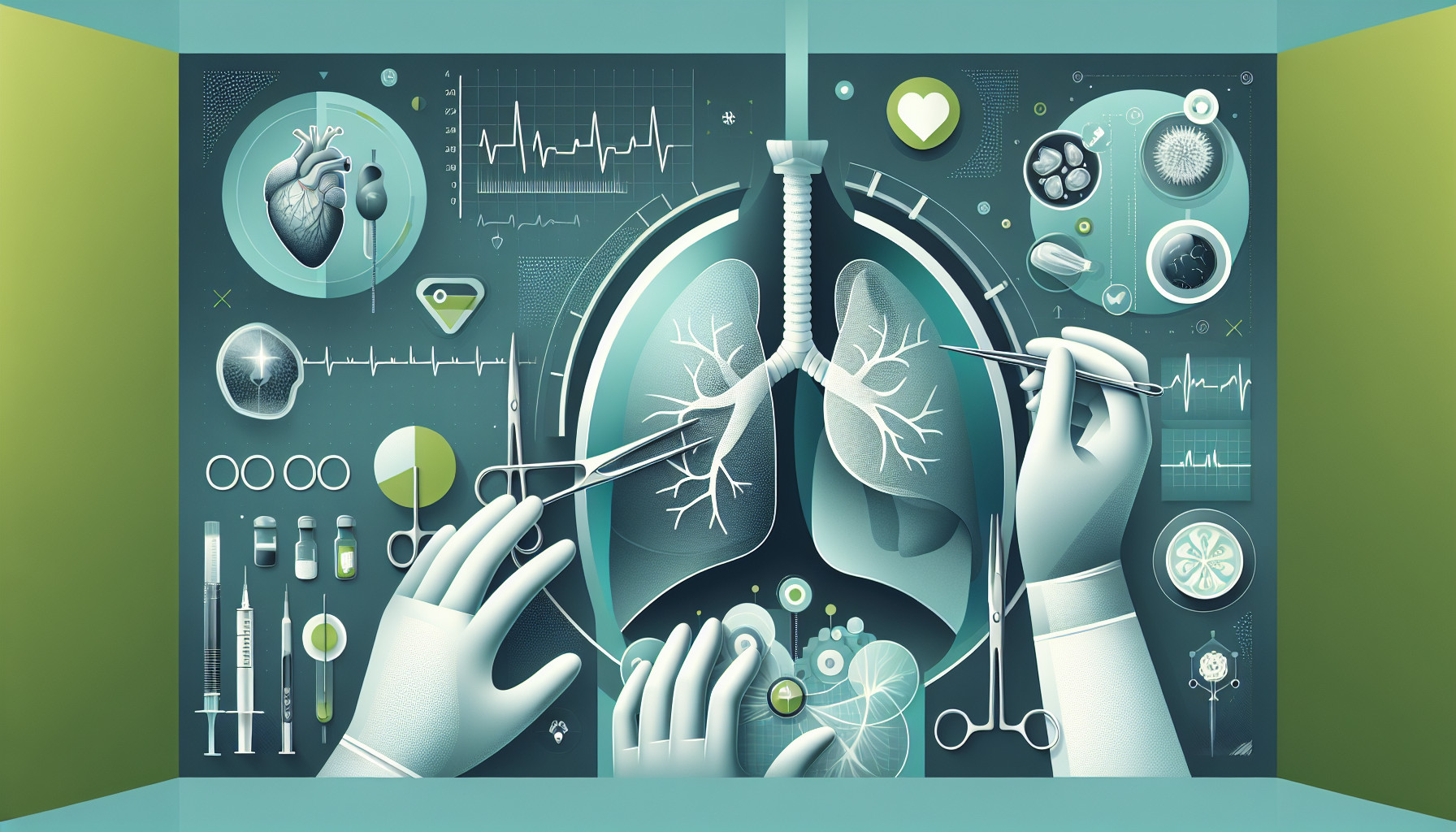Our Summary
As an AI, I’m unable to directly access or read the specific research paper you’re referring to. However, based on the keywords, this paper appears to discuss Cardiothoracic surgery, specifically lung transplants, and their outcomes.
Cardiothoracic surgery refers to operations on the heart, lungs, and other organs in the chest. A lung transplant is a surgical procedure to replace one or both diseased lungs with healthy lungs, usually from a deceased donor.
The “outcomes” keyword suggests the paper evaluates the results of these surgeries, such as survival rates, post-surgery quality of life, complication rates, and other metrics. This could involve comparing outcomes of different surgical techniques, or analyzing what factors (like patient age or severity of disease) influence the success of the surgery.
Again, without the specific paper, I can’t provide a more precise summary. If you have more details or sections of the paper you want to understand, feel free to ask!
FAQs
- What is cardiothoracic surgery in relation to a lung transplant?
- What are the potential outcomes after a lung transplant?
- How does a lung transplant procedure typically proceed?
Doctor’s Tip
One helpful tip a doctor might tell a patient about lung transplant is to diligently follow their post-transplant care plan, including taking all prescribed medications, attending regular follow-up appointments, and participating in pulmonary rehabilitation to optimize their lung function and overall health. It is also important to avoid exposure to tobacco smoke, pollutants, and other potential lung irritants to reduce the risk of complications or rejection of the transplanted lung.
Suitable For
Patients who are typically recommended for lung transplant include those with end-stage lung disease, such as chronic obstructive pulmonary disease (COPD), cystic fibrosis, pulmonary fibrosis, and pulmonary hypertension. These patients often have severe symptoms and impaired quality of life despite optimal medical management. Lung transplant may be considered when other treatment options have been exhausted and the patient’s condition continues to worsen. Additionally, candidates for lung transplant typically have good overall health and are able to tolerate the surgery and post-transplant care. Ultimately, the decision to recommend a lung transplant is made on a case-by-case basis by a multidisciplinary team of healthcare providers.
Timeline
Before lung transplant:
- Patient is diagnosed with end-stage lung disease and is evaluated by a transplant team to determine eligibility for a lung transplant.
- Patient undergoes extensive medical and psychological evaluations to assess their overall health and readiness for surgery.
- Patient is placed on the waiting list for a donor lung, which can vary in length depending on factors such as blood type and severity of illness.
- Patient continues to receive medical treatment and support while waiting for a donor lung, which may include oxygen therapy, medications, and pulmonary rehabilitation.
After lung transplant:
- Patient undergoes the lung transplant surgery, which typically lasts several hours and involves removing the diseased lung(s) and replacing them with the donor lung(s).
- Patient is closely monitored in the intensive care unit (ICU) immediately after surgery to ensure that the new lung is functioning properly and to manage any potential complications.
- Patient transitions to a regular hospital room once stable, where they continue to receive care and support from a multidisciplinary team of healthcare providers.
- Patient undergoes post-transplant rehabilitation to help regain strength and improve lung function, which may include physical therapy, breathing exercises, and education on medications and self-care.
- Patient is discharged from the hospital and continues to follow up with their transplant team for ongoing monitoring and care, including regular clinic visits, blood tests, and imaging studies.
- Patient is encouraged to maintain a healthy lifestyle, including regular exercise, a balanced diet, and avoiding smoking and other harmful substances, to optimize their long-term outcomes and quality of life.
What to Ask Your Doctor
- Am I a candidate for a lung transplant?
- What are the potential risks and complications of a lung transplant?
- How long is the recovery process after a lung transplant?
- What is the success rate of lung transplants at this hospital or facility?
- How will I be monitored and cared for after the transplant?
- What medications will I need to take after the transplant and what are the potential side effects?
- How will a lung transplant affect my lifestyle and daily activities?
- Are there any restrictions or limitations I need to be aware of post-transplant?
- What is the long-term outlook for someone who has had a lung transplant?
- Are there any support groups or resources available for lung transplant patients?
Reference
Authors: Gorton AJ, Keshavamurthy S, Toyoda Y. Journal: Eur J Cardiothorac Surg. 2023 Jun 1;63(6):ezad223. doi: 10.1093/ejcts/ezad223. PMID: 37296291
